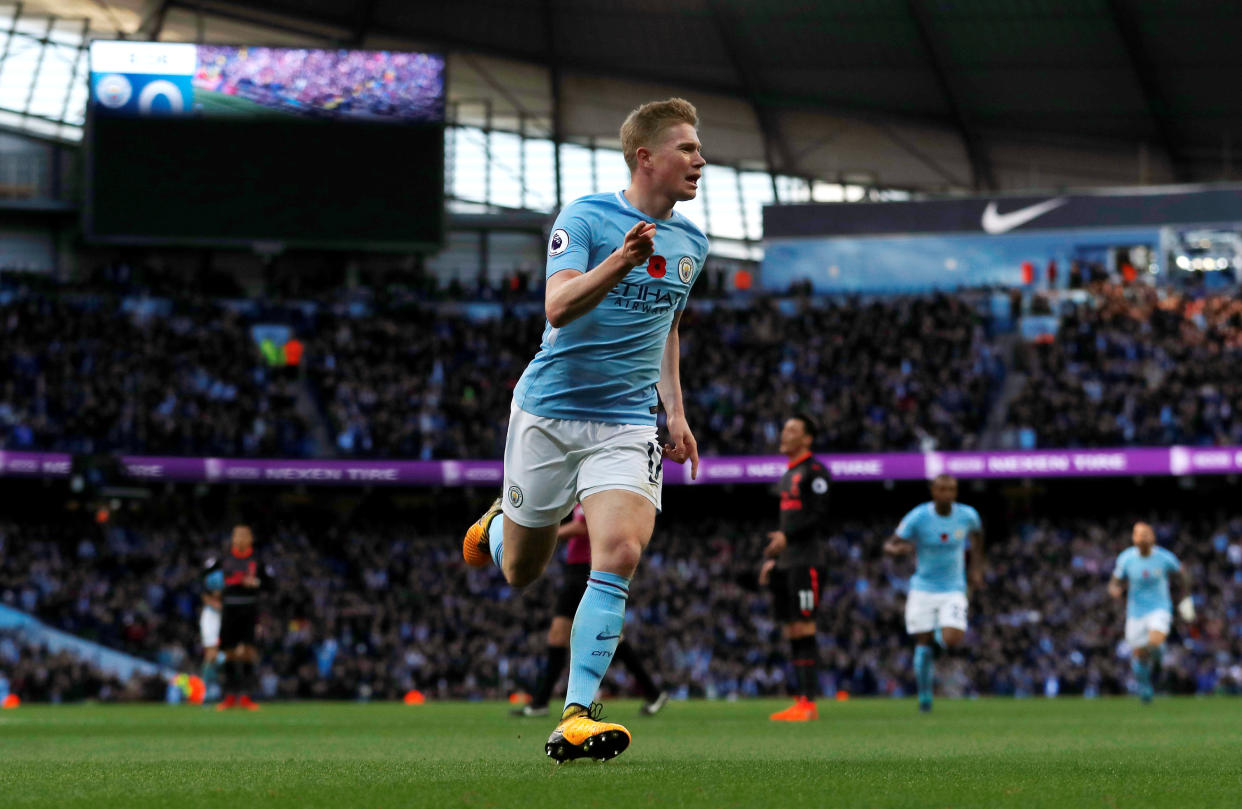Kevin De Bruyne's new contract underscores total player power in soccer

Kevin De Bruyne has had a scintillating fall. The Belgian attacking midfielder has been the engine to Manchester City’s otherworldly start to the season, contributing six goals and eight assists in the Premier League alone, recalling Zinedine Zidane in his best days — only with red hair instead of the Frenchman’s atoll-shaped coiffe.
The 26-year-old, who is at the very peak of his prime, has 3 1/2 seasons left on the six-year contract he signed with City upon his transfer from Wolfsburg in the summer of 2015. He earns an enormous-by-soccer-standards $8 million a year. But he’s been playing well. So now he wants a new contract.
Per the Guardian, City will offer De Bruyne a fresh six-year commitment worth $14.6 million annually. In essence, the club will nearly double the salary for one of its own players, bidding only against itself. There are no other offers.
Why?
Because City knows that if it doesn’t pay him what he wants, one of the best players in the game might leave. Maybe to Barcelona. Maybe to Real Madrid. And De Bruyne would force City to enter into a player market where even one of the richest clubs in the world would struggle to replace him, given the dearth of that sort of talent and the hyperinflation for it — driven by an influx of TV, oil and gas money from eager broadcasters and benefactors from rivaling Gulf states. It’s cheaper and less painful to just give De Bruyne whatever he wants.
Because on De Bruyne’s end, his existing contract ultimately doesn’t mean anything. Whereas the club can be legally compelled to pay out, the player can force a move simply by making a big fuss and refusing to play. An employer can be made to honor a contract, but a worker can’t be obligated to work. The clubs know this. And getting into a public fight with a player over his wish to leave is a bad look on the club and a poor negotiation platform for extracting maximum value for him from some other club.
The truly elite talent in soccer now goes where it wants and makes what it wants. This is the age of total player power, abetted by clubs who have lost all control in the span of just two decades. Since the European Court of Justice set Jean-Marc Bosman free in 1995, thereby granting all European soccer players their free agency, the clubs’ power has quickly eroded from absolute to symbolic.
[ Follow FC Yahoo on Twitter and Facebook ]
That’s why City, according to that same Guardian report, is also in talks to renew contracts for its Brazilian trio of goalkeeper Ederson, midfielder Fernandinho and forward Gabriel Jesus. The latter has been at the club less than a year but has played better than expected, given that he’s only 20. Ederson, meanwhile, has not quite been at the club seven months and has appeared in all of 24 competitive games. But he, too, has been an early sensation and is therefore apparently entitled to more money.
This is because the player market was rocked this summer when Neymar made a world-record $262 million move from Barcelona to Paris Saint-Germain, where he is now paid a stupefying $35 million a year. That smashed through the hypothetical ceiling on what players can earn — which happens every few years — and shook up the existing pay scale like a snow globe. Suddenly, almost everybody was underpaid by comparison, no matter where they stood on the hierarchical ladder of player talent. This notion was only reinforced when PSG added a scarcely proven teenager, Kylian Mbappe, and gave him a contract for almost $21 million a year. That instantly made the super-prospect, who turns 19 on Wednesday, one of the best-paid players in the world.
Meanwhile, Neymar, not yet 140 days into his time in Paris, is already kicking up speculation about his next transfer. Apparently Real Madrid is eager. One tabloid reports that another tabloid reports that Neymar’s father and one-time stakeholder — he held almost half his son’s rights while a teenaged Neymar was still at Santos in his native Brazil, perversely — had dinner with Real president Florentino Perez.
There apparently is a release clause in Neymar’s contract of either $265 million or $294 million — again, semi-credible reports. And so he could be on the move again this summer. Maybe. But if he is, he’s definitely getting another fat raise, remaking the salary landscape anew.
This first toppled speculation domino has sent all the others tumbling as well. If Neymar moves to the Spanish capital, Cristiano Ronaldo will want to leave Real. And maybe Karim Benzema or Gareth Bale would as well. Meanwhile, Paulo Dybala could head north from Juventus to Paris to replace Neymar at PSG.
For now, these are all imaginary moves. There’s scant indication that any such transactions are really in the works. But even the mere whiff of them acts as leverage to said players and their busy-bee agents. Any excuse will do to try to get an old contract ripped up and replaced with a bigger, longer one. For a time, Barca’s Lionel Messi seemed to be getting a new contract every year on the off-chance that he’d make some unrealistic move away from the club — rumored by his agents, of course — he’d been at since he was 13, with the Catalans perpetually topping their own offer, the only offer.
But every now and again, one of these mega-deals actually gets done. And then the market for player salaries changes. And Kevin De Bruyne will probably want another raise.
Leander Schaerlaeckens is a Yahoo Sports soccer columnist and a sports communication lecturer at Marist College. Follow him on Twitter @LeanderAlphabet.



